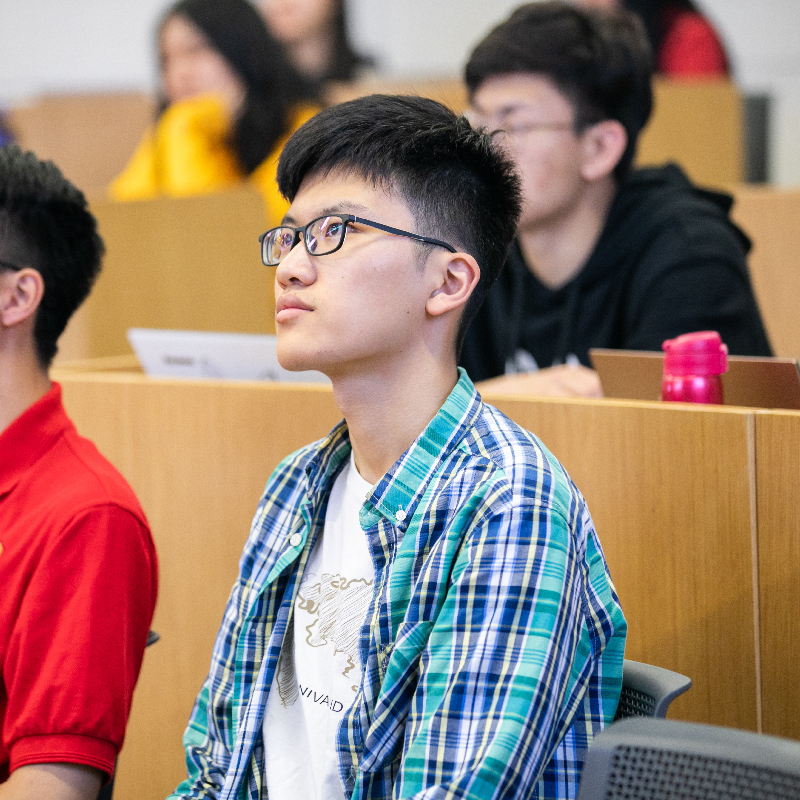
Applied mathematics student Zikang Jia, who spoke at the 2021 European Geoscience Union General Assembly in Vienna
By John Butcher
Staff writer
From frustrated high school student worried about the haze of pollution enveloping his hometown to researcher involved in the global struggle to tackle the issue, Zikang Jia has come a long way in three years.
A rising senior at Duke Kunshan, Jia has been part of a research team developing mathematical modeling to measure the impact of Covid-19 lockdowns on pollution levels and last month spoke at an international conference in Austria to present the findings.
“I think math can provide us with not only solutions to different problems but also different insights about how we understand these kinds of issues,” said Jia, an applied mathematics major.
Jia comes from Jinan, Shandong province, along the northern stretch of China’s eastern seaboard. The area is highly industrialized and in his teens saw heavy pollution that could sometimes linger as a thick smog for weeks.
By high school he was a boarding student, living on campus in a small town close to Jinan, surrounded by industrial plants. It was here, looking out of his window at the inescapable gray haze surrounding the school, that he began to develop a desire to do something about it.
A few months later, Jia joined DKU, having chosen the university because of the broad range of “different possibilities” available here, both academically and socially.
He was also drawn to DKU because of the research opportunities it offered, and last year grabbed the chance to embark on a project applying mathematical modeling to pollution as the world began to battle with the Covid-19 pandemic.
“At a Chinese university you would not get this kind of opportunity during undergraduate life. Your teacher would think that you are too young to conduct this type of research, but at DKU my research advisor, professor Song Gao, encourages me to believe in myself,” he said.
That research project was the beginning of a path to speaking at the 2021 European Geoscience Union General Assembly in Vienna, one of the world’s top geoscience conferences.
In January, the research team submitted an abstract of their work to the conference organizers, receiving a reply the following month inviting them to talk about it at the event. Jia was chosen as the presenter and relished the opportunity.
“I wasn’t nervous. I was kind of looking forward to it,” he said.
The research project, led by Gao, professor of environmental science and chemistry, focused on revealing the extent to which Covid-19 lockdowns in 2020 reduced levels of nitrogen dioxide in the air, in urban areas of China. Nitrogen dioxide, produced primarily by transport and coal-powered plants, is a major cause of respiratory issues, such as lung cancer, and a good barometer of overall pollution levels.
What was unique about the project was its use of pollution data from the TROPOMI satellite, combined with ground-level measurements and machine learning to create an accurate comparison with the previous year by factoring in influences on pollution, such as weather conditions.
“The combination of factors was new,” said Jia, and recorded a much more accurate picture of changing pollution levels than would otherwise have been achieved.
In the Jing-Jin-Ji region of China (comprising Beijing, Tianjin and Hebei province), surface-level measurements showed a 21 percent decline in nitrogen dioxide levels, but with satellite data added and machine learning modeling applied, this rose to a 42 percent drop. Around Shanghai, surface modeling found a 28 percent fall in nitrogen dioxide levels, rising to 35 percent using the research study’s method.
The significance of this is that it could be repeated elsewhere to provide a more accurate picture of pollution and the impact of government policies on it, said Jia.
Now the conference is behind him and his junior year at DKU has drawn to a close, Jia has plans for the summer. He will take time to reflect on the past three years of university, he said, as well as traveling in China with friends.
In the near future, he plans to start applying for postgraduate study in applied mathematics in the United States or Europe, he said. Pollution is likely to remain a focus of his study, he added, but he would also like to combine mathematics with comedy, if he can.
“I think I will try to do that,” he said. “I registered for a presentation course in the last session, and I tried to combine mathematics with a humorous talk show presentation. The audience couldn’t fully understand the math concepts though.”

